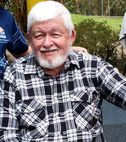Brian Joseph Prove
Full Circle of a Life Lived in Faith.

 Search...
Search...

Born in Walgett, Western NSW, Dr Hammill attended high schools at Narrabri and Broken Hill, where she also undertook her nursing training. Her nursing career began in rural NSW, before moving to Sydney where she was a ward nurse and had cared for wealthy private patients around Kings Cross and Sydney Harbour.
In both Wewak and Port Moresby, Papua New Guinea in the early 70s and mid 80s, she had her first experiences in nursing indigenous people. She married while in Papua New Guinea and upon returning to Australia, she continued nursing on Palm Island and later at the Royal Brisbane Hospital. It was these experiences that led her, at the age of 50, to complete a Masters Degree in Tropical Health.
This was quickly followed by a PhD in Medical Anthropology. She specialised in medical ethnography which allowed her to examine the epigenetics of disability and disadvantage. Her work into the epigenetics and neuroscience of Fetal Alcohol Syndrome (FAS) became her passion and her lasting gift to many communities.
FAS is a condition that affects many children and adults across cultural divides but most particularly in indigenous populations in Australia and overseas. Discovering and showing great respect for her own indigenous Gomeroi and convict ancestry later in life meant she was never one to shy away from reality or the challenge to make her world a better place. Her achievements reach across four significant areas.
Her pioneering research into this syndrome meant she opened a conversation by offering evidence-based proof of its devastating repercussions. In 2005, Dr Hammill collaborated with a team of ten indigenous researchers and colleagues from across Australia to apply for an Indigenous Capacity Building grant from the National Health and Medical Research Council. A 5-year grant was awarded to the team whose work heralded a significant period for Indigenous health research.
In late 2009, along with several colleagues, the Fetal Alcohol Syndrome Disorder (FASD) scientific research group at the University of Queensland (UQ) was formed, of which she became a senior researcher. The research group also consulted a support group of parents and other family carers of children affected by the syndrome from QLD and interstate.
In 2008, Dr Hammill was recognised with an AM for her "service to the community through health services for indigenous women and children and research into the effects of fetal alcohol syndrome".
In 2009, as Honorary Research Fellow at UQ's Centre for Clinical Research, she became the Coordinator of the Collaboration for Alcohol Related Developmental Disorders research network (CARDD), formerly the FASD group. CARDD played a significant role in bringing about change in the judicial system, which at the time knew little about FASD or the underlying medical conditions and the histories that resulted in Aboriginal and Torres Strait Islander people who found themselves before the courts. The widespread implications of FASD for the incarceration of indigenous children and families had received little to no acknowledgement.
In late 2011, CARDD research found that there were no specific policies or approaches to FASD across the judicial system. Dr Hammill collaborated in writing a paper, "Judicial Views of Fetal Alcohol Spectrum Disorder in Queensland's criminal justice system" that was published in the Journal of Judicial Administration in 2012. A federal parliamentary inquiry in 2012 called for FASD to be officially recognised as a disability, stressing the need for better awareness among police, lawyers, judges and prison staff.
Dr Hammill was runner-up in the 2017 Queensland Senior Australian of the year awards. She received her nomination for over twenty years of care and work in the area of Fetal Alcohol Spectrum Disorder (FASD).
In early 2017, FASD researchers were awarded a Drug and Alcohol Prevention and Early Intervention Grant of over $1 million dollars to expand FASD services in QLD that Dr Hammill hailed as "a groundbreaking initiative in training remote communities in what will now be essential and meaningful services for diagnosis and ongoing care." This work continues today through her colleagues in health and the legal systems.
Her unflagging work in indigenous communities: providing support and education about family and domestic violence (the Jundah Aboriginal Women's Corporation) and inaugurating the Cherbourg Billy Kart races. This brought together Tickford Vehicle Engineering and the local community in an educational program over three years that was designed to inspire local children to commit to the value of education.
Dr Hammill was proactive in her education and training of those interested in working in indigenous health. She continued to share what she proved was incontrovertible evidence during presentations and conferences in her post retirement. This showed that colonisation was one of the root causes of Indigenous disadvantage due to changes caused at the cellular level of Aboriginal and Torres Strait Islander peoples. Alcohol and the alcohol industry were unashamedly in her sights as one of the most detrimental causes of poor health and social disadvantage.
One of her proudest achievements was becoming a world champion powerlifter at the age of 77. Those who knew her will be familiar with her quirky and offbeat sense of humour and terrible jokes told over dinners wearing a MuMu and tiara. Her home was often full of laughter and students listening to sage advice on everything from interior decoration, garden design to what we need to do to fix the health and legal system.
Share your own story or eulogy about a loved one, online in a safe environment for future generations. Please click below.
Share their story